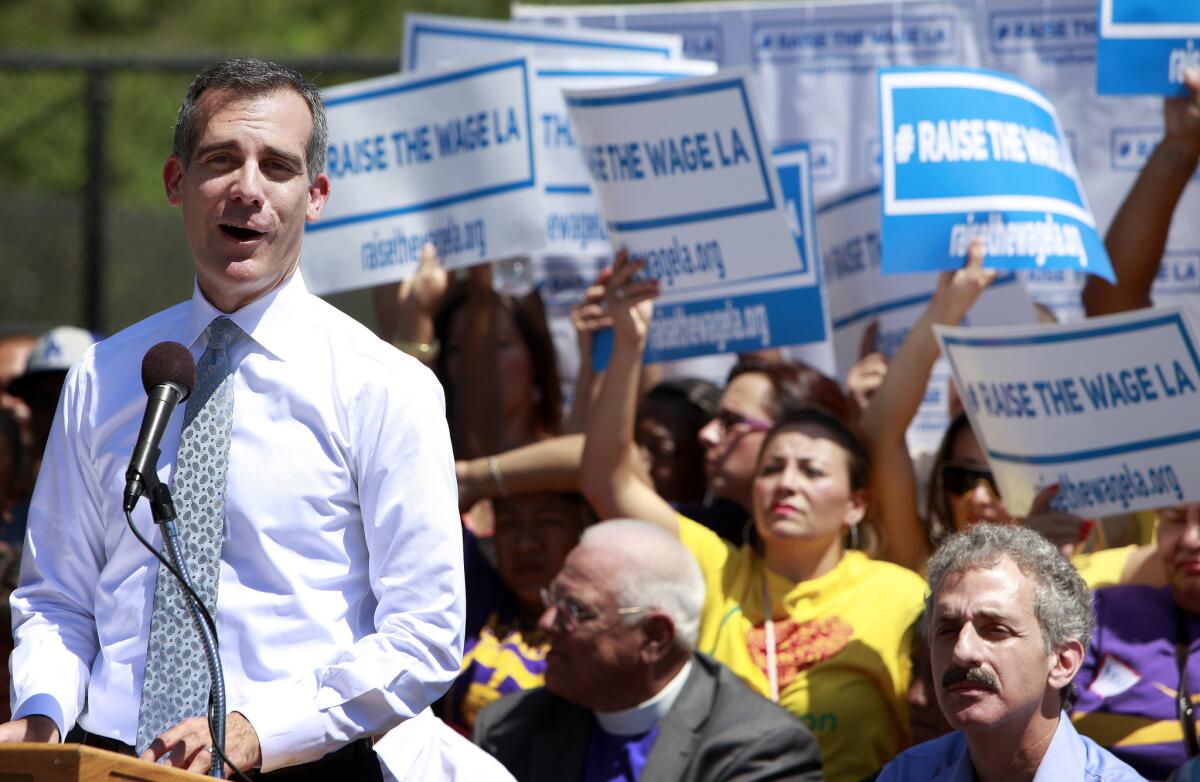Op-Ed: Why mandating higher minimum wage isn’t best way to address poverty

Los Angeles Mayor Eric Garcetti and Chicago Mayor Rahm Emanuel, among other city and state officials across the country, have recently proposed raising the minimum wage well beyond the current state-mandated levels of $9 an hour in California and $8.25 in Illinois. And public opinion polls generally show widespread support for these actions.
At first blush, what’s not to like: Low-income workers could take home from $1,000 to $5,000 more a year, and in an era of increasing inequality of income and poverty rates that hover around 15% nationally, that is not an insignificant boost.
Yet this advocacy raises some troubling questions, among them whether it’s an appropriate government intervention in the free market. In general, except for temporary measures to prevent, say, price gouging in the aftermath of a unexpected disaster, we as a nation generally regard price controls as bad social and economic policy.
Instead, we allow businesses to charge whatever the market will bear and rely on competitive market forces to keep prices in line with costs. Thus, we don’t tell Nike what price to put on its sneakers or McDonald’s how much to charge for a Quarter Pounder. The presence of competitors for their products, along with reasonably informed consumers, keeps McDonald’s and Nike from marking up their burgers and shoes unconscionably. And in the 21st century, thanks to huge drops in the costs of communications and transportation, coupled with increased international competition, businesses arguably have less power over consumers than they have ever had.
The same pressures of competition also affect the other side of the market — that is, wages. Businesses are under pressure not to unilaterally cut wages, because workers, like customers, have alternatives; they can quit if an employer isn’t paying market rate and look for employment elsewhere. This very real threat keeps firms from reducing pay. Even without minimum wage laws, the interaction of supply and demand would conspire to keep wages about what they are today, based on workers’ experience, productivity and discipline.
The argument made in some quarters is that raising wages has little downside for businesses. Higher pay, the theory goes, would allow them to attract higher-quality workers and make even higher profits. But such hypotheses ring hollow. If a well-oiled corporation such as McDonald’s or Nike could make more money by paying out more in wages to higher-skilled employees, they would have already made that conversion. And even if it were true, the current crop of workers would inevitably lose their jobs as firms substituted more productive employees.
And the fact remains that far from taking advantage of their employees, most businesses pay most workers more than the minimum. Electricians, junior accountants, chefs, store managers, to name only a few, are all paid well over the minimum wage, as are most workers in America.
Why? If firms have so much market power, and they’re looking to maximize profits, why does anyone make more than the legal minimum? Because the value of the contributions higher-paid employees make to their employers justifies their pay.
Mandating above-market wages for workers whose contributions aren’t as valuable can have unintended consequences. Affected firms might well consider substituting machines for workers whenever possible, or relocating to a more welcoming environment. The lure of Indiana and Wisconsin for Illinois firms, or Nevada and Texas for California-based companies, could prove irresistible. Moreover, families might choose to shop, recreate or retire in nearby communities with more favorable prices and tax systems.
But the chief argument against this new trend in cities and states of mandating a higher minimum wage is that it’s not the best way to achieve the goal of pulling hardworking people out of poverty.
In the short run there are more efficient, less intrusive avenues to improve the economic lot of unskilled workers in this country. Tweaks to the federal government’s Earned Income Tax Credit program would be one way to put more money into the pockets of those who need it. Longer term, the goal should be to improve human capital prospects for those at the bottom of the economic ladder, ensuring that all people have opportunities to develop the skills and knowledge that will make them worth far more than the current wage rate or poverty standard. That would be a happy outcome not only for low-wage workers but for businesses, for families and for the larger economy.
Allen R. Sanderson teaches economics at the University of Chicago.
Follow the Opinion section on Twitter @latimesopinion
More to Read
A cure for the common opinion
Get thought-provoking perspectives with our weekly newsletter.
You may occasionally receive promotional content from the Los Angeles Times.






